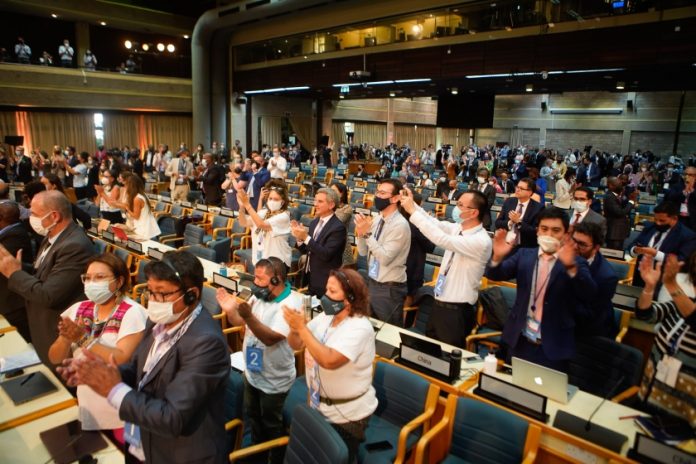With the help of EU diplomacy which has helped secure the support of the global community, the United Nations Environment Assembly (UNEA), meeting in Nairobi, agreed on March 2 to launch negotiations on a legally binding global agreement to reduce and eventually eliminate plastic pollution in all environments.
“It is encouraging to see the global community come together at this time of crisis,” European Commission Executive Vice-President for the European Green Deal, Frans Timmermans said. “Ever since the European plastics strategy was presented in 2018, the European Union has been a driving force to tackle plastic pollution. We are determined to keep pushing for ambitious global action, as the fight against the climate and biodiversity crises must involve all of us,” he added.
Speaking from Nairobi, Commissioner for Environment, Oceans and Fisheries Virginijus Sinkevicius welcomed the agreement. “About 11 million tonnes of plastic currently enter the ocean every year and this amount will triple in the next 20 years without an effective international response. Thus I am glad that with EU input the global community today stepped up to fight plastics pollution. We will engage actively in the discussions of a legally binding agreement that looks at all stages of the plastics life cycle from product design to waste,” Sinkevicius said.
According to the Commission, the future agreement will aim to close the gaps that existing initiatives and agreements do not address, especially at the design and production phases of the plastics life cycle. It should bring together all stakeholders to achieve the overall goal to eliminate the leakage of plastic into the environment.
The EU has put significant efforts throughout the years in outreach activities, working with partners and building support for a legally binding global agreement on plastics. The EU played a key role in bringing together the coalition of countries that spearheaded efforts towards today’s decision in Nairobi.
As outlined in the European Green Deal and the Circular Economy Action Plan, the EU has emphasised the need for circular, life-cycle approach to plastics as a basis for a new legally binding global agreement. The solution lies in prevention, proper design and production of plastics, and their resource-efficient use, followed by sound management when it becomes waste. Sinkevicius advocated this approach as a global priority in Nairobi.
The EU and its Member States believe that a global instrument needs to promote action at the national, regional and global levels and in particular enable countries to adopt implementation policies according to national specific circumstances, while applying a circular approach to plastics, the EU Commission said.
The future agreement could further identify the need for standards as well as measurable goals, and strengthen monitoring of plastic pollution, including marine plastic pollution, and assessment of their impacts in all environmental compartments. This would enable the adjustment of measures, both at the national and regional specific levels.
The decision mandates the holding of the first session of the Intergovernmental Negotiating Committee in the second semester of 2022 and establishes the ambition to conclude negotiations by 2024. The EU will continue to work with its allies and other partners aiming at a rapid conclusion of the negotiations.
UNEA-5 President and Norway’s Climate and Environment Minister Espen Barth Eide noted that against the backdrop of geopolitical turmoil, the UN Environment Assembly shows multilateral cooperation at its best. “Plastic pollution has grown into an epidemic. With today’s resolution we are officially on track for a cure,” he said.
UNEP Executive Director Inger Andersen said the agreement marks a triumph by planet earth over single-use plastics. “This is the most significant environmental multilateral deal since the Paris accord. It is an insurance policy for this generation and future ones, so they may live with plastic and not be doomed by it,” he said. “Let it be clear that the INC’s mandate does not grant any stakeholder a two-year pause. In parallel to negotiations over an international binding agreement, UNEP will work with any willing government and business across the value chain to shift away from single-use plastics, as well as to mobilise private finance and remove barriers to investments in research and in a new circular economy,” Andersen added.
According to Japan’s Environment Minister Tsuyoshi Yamaguchi, the resolution will clearly take the world towards a future with no plastic pollution, including in the marine environment. “United, we can make it happen. Together, let us go forward as we start the negotiations towards a better future with no plastic pollution,” said Yamaguchi, whose draft resolution contributed to the final resolution.
Peru’s Environment Minister Modesto Montoya, whose draft resolution, proposed with the Government of Rwanda, contributed to the final resolution, Peru will promote a new agreement that prevents and reduces plastic pollution, promotes a circular economy and addresses the full life cycle of plastics.
Rwanda’s Environment Minister Jeanne d’Arc Mujawamariya noted that the world has come together act against plastic pollution – a serious threat to the planet. “International partnerships will be crucial in tackling a problem that affects all of us, and the progress made at UNEA reflects this spirit of collaboration,” she said, adding, “We look forward to working with the INC and are optimistic about the opportunity to create a legally binding treaty as a framework for national ambition-setting, monitoring, investment, and knowledge transfer to end plastic pollution”.








